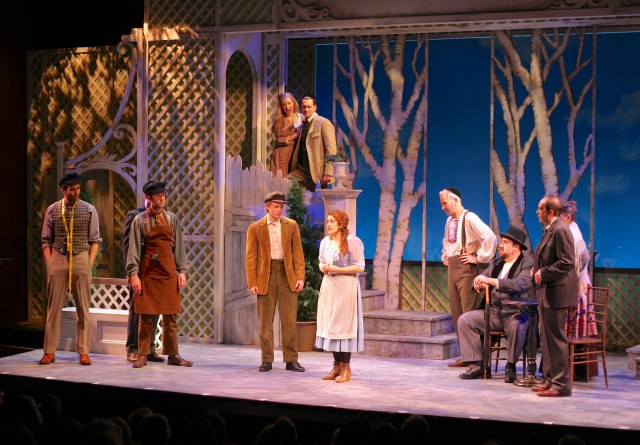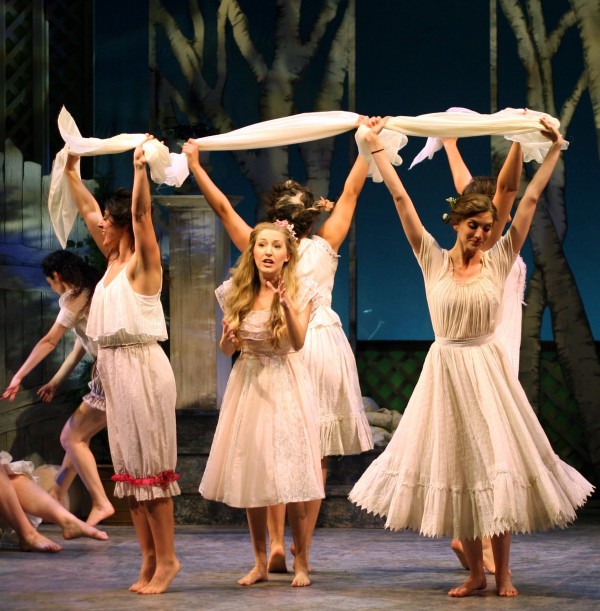
The National Yiddish Theatre Folksbiene inaugurates its new home at the Museum of Jewish Heritage with THE GOLDEN BRIDE (photo by Ben Moody)
Museum of Jewish Heritage — A Living Memorial to the Holocaust
Edmond J. Safra Plaza, 36 Battery Pl.
Tuesday-Wednesday and Thursday-Sunday through January 3, $40
866-811-4111
nytf.org
www.mjhnyc.org
The utterly delightful Yiddish operetta The Golden Bride returns to New York City at just the right time, a very tasty appetizer to the latest Broadway revival of Fiddler on the Roof. But the work, known in Yiddish as Di Goldene Kale, is more than just a mere precursor to the award-winning 1964 musical and 1971 film about the Jewish experience in Tsarist Russia; it stands alone as an engaging celebration of shtetl life as it explores the hopes and dreams of its many charming characters. The operetta premiered in February 1923 at the two-thousand-seat Second Avenue Theater and ran for eighteen weeks before going on tour around America and the world; it was last performed in 1948 before disappearing into obscurity until musicologist, librarian, and editor Michael Ochs uncovered parts of the long-lost work while preparing an exhibition in 1992, then spent more than two decades putting it back together again. The new production kicks off the National Yiddish Theatre Folksbiene’s 101st season, the first in its cozy new 375-seat home in Edmond J. Safra Hall at the Museum of Jewish Heritage. In a small, close-knit Russian village, Goldele (Rachel Policar), an abandoned child raised by innkeepers Pinkhes (Bruce Rebold) and Toybe (Lisa Fishman), has suddenly come into a large inheritance at the death of her long-absent father, making her the most desirable woman in the shtetl. She is in love with Misha (Cameron Johnson), Pinkhes and Toybe’s handsome son, but she offers her hand in marriage to any man who can find her mother, who she is sure is still alive. Thus, cobbler Berke (Jeremy Weiss), choir singer Motke (Zachary Spiegel), and tailor Yankl (Adam Kaster) set off in a race with Misha to track down Goldele’s mother and marry the Golden Bride, who in the meantime is moving to America to live with her uncle Benjamin (Bob Ader), whose wealth has already turned the shtetl “upside-down,” as Pinches and Toybe exclaim, with the help of the chorus, “We’ll become as rich as Korach, / We’ll live, laugh, it’ll be a sensation. / The dear millionaire will be my guest, / The dear millionaire will be his guest, / I’ll give him kugel with tsimmes. / She’ll give him kugel with tsimmes.” However, Benjamin wants Goldele to marry his son, Jerome (Glenn Seven Allen), who just happens to be smitten with Khanele (Jillian Gottlieb), Pinkhes and Toybe’s daughter. “Don’t you know what I want? Come here, I’ll tell you. I want a kiss from your sweet little lips,” Jerome says to Khanele, who replies, “Oh, go away — it’s Sabbath already.” “You shouldn’t kiss on Sabbath?” Jerome asks, to which Khanele declares, “Certainly you shouldn’t. A lot you know about Judaism! Even a goy knows more than you.” In the second act, the action travels overseas to America, where everyone tries to establish their future, built on love and money.

The fully restored Yiddish theater favorite DI GOLDENE KALE kicks off the National Yiddish Theatre Folksbiene’s 101st season in a big, delightful way (photo by Ben Moody)
Performed in Yiddish with English and Russian supertitles, The Golden Bride is a complete and utter joy from start to finish. The music, by little-known Lithuanian composer Joseph Rumshinsky, who actually wrote nearly one hundred Yiddish operettas, is light and bouncy, while the lyrics, by Ukrainian-born Louis Gilrod, are endearing and playful. The libretto, written by Polish native Frieda Freiman but originally published under her husband’s name, is sweet and witty. “Listen to me, friends,” Misha says when defending his love of Goldele to her other suitors. “I have a cure for your loving hearts. Each of you take a large piece of wood and knock the foolishness out of your heads.” While there is no evidence that Fiddler on the Roof lyricist Sheldon Harnick and book writer Joseph Stein ever saw or read The Golden Bride or that Rumshinsky, Freiman, and Gilrod (who all moved to America from Eastern Europe between the ages of twelve and twenty-two) were influenced by the Sholom Aleichem stories that formed the basis of Fiddler, many intriguing similarities and coincidences abound between the two works, from dialogue (Jerome seriously asks Khanele, “Do you love me?” recalling what Tevye asks his wife, named, er, Golde) to subplots (matchmaker Kalmen goes through his little black book, trying to find husbands for several young women, including one named, er, Yente: “I have for you a bridegroom, a ‘waiter’ who washes ‘dishes,’ / He’s also a ‘salesman’ at Yonah Schimmel’s Knishes”) to the general depiction of shtetl life. However, Anatevka has a very different fate in store for its residents, as Fiddler is far more political and heartbreakingly realistic than Bride, although the latter did come out right before the Immigration Act of 1924 (aka the National Origins Act), which set a restrictive quota on immigration to the U.S. from Eastern Europe and Asia. The actors, most of whom don’t know Yiddish and so perform their parts phonetically, are excellent, led by Policar, who has major operatic chops, her voice echoing beautifully throughout the theater, and Johnson, with strong turns by Rebold, Fishman, Adam B. Shapiro offering comic relief as Kalmen and the women’s chorus/ensemble of Amy Laviolette, Tatiana Wechsler, Jessica Kennedy, Liza Miller, Isabel Nesti, and Alexis Semevolos. National Yiddish Theatre Folksbiene artistic director Zalmen Mlotek conducts the fourteen-piece orchestra, situated behind the stage, while choreographer Merete Muenter makes clever use of the crowded set, which features a whimsical, homey design by John Dinning. To answer Jerome’s question, “Do you love me?” we say, yes, yes, we do love you!
(The National Yiddish Theatre Folksbiene and the Museum of Jewish Heritage have teamed up to provide free shuttle bus service to and from Columbus Circle for each performance. NYTF is also offering a free fifteen-minute Yiddish lesson and history of Yiddish theater forty-five minutes before each show. And on December 26 at 8:00, the museum will host “Dreaming in Yiddish: The Fourth Annual Adrienne Cooper Memorial Concert,” with Frank London, Sarah Gordon, Michael Winograd, and Joshua Dolgin presenting an evening of music from the 1999 album In Love and in Struggle: The Musical Legacy of the Jewish Labor Bund.)